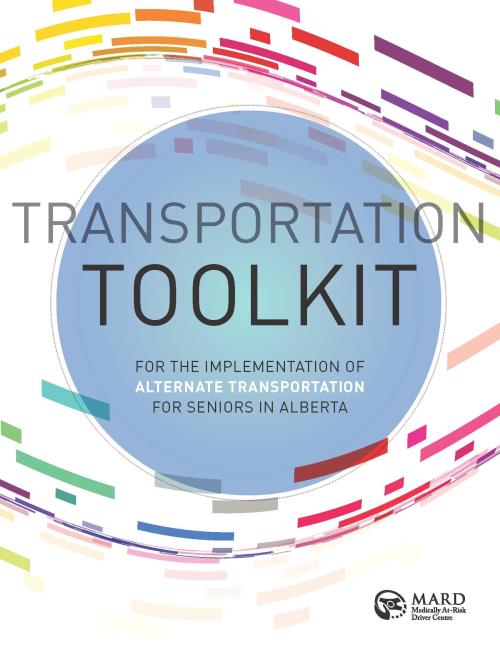
Front cover of the soon-to-be released toolkit.
From health care to Canada Pension Plan payouts, the cost of Canada's aging population is a hot topic. In Alberta, the proportion of seniors is projected to increase to 20 per cent over the next 30 years. But what about the cost of aging for those experiencing it?
For many seniors, the aging process is associated with a loss of transportation mobility, due in large part to involuntary and voluntary driving cessation. In addition, giving up driving is associated with difficulties in accessing medical care, socializing or even simply getting groceries. Loss of mobility and independence also can be stressful for caregivers and family members as they often become the transportation providers. This is because access to community transportation frequently is limited, non-existent, or not adequately designed to meet the unique mobility needs of the senior population. One of the solutions to more accessible transportation for seniors in the community is what is called alternate transportation for seniors.
There are a number of challenges to implementing transportation services for seniors in urban and rural communities. The absence of "easily accessible" and targeted information on implementation of alternate transportation for seniors is one of the challenges. To address this need, the researchers at the Medically-at-Risk Driver (MARD) Centre, headed by Dr. Bonnie Dobbs of the Department of Family Medicine, developed a Transportation Toolkit for the Implementation of Alternate Transportation for Seniors in Alberta. The goal of this toolkit is to assist communities in rural and urban Alberta with the resources needed for the successful development and implementation of sustainable, responsive models of alternate transportation for seniors.
To foster uptake, MARD Centre researchers have held workshops throughout the province throughout the year. These workshops were held in seven communities in Alberta: Medicine Hat, Lethbridge, Calgary, Red Deer, Edmonton, Grande Prairie and Cold Lake. These interactive workshops showcased the steps needed to set up alternate transportation services for seniors in the community and provided information on areas that are critical to implementation of this type of service (e.g., insurance issues, purchasing vehicles, the process of setting up a not-for-profit organization, etc.). The workshops also were designed to promote networking and collaboration to foster a "community of practice" and knowledge exchange. The Transportation Toolkit will be formally launched in February 2016: please check the MARD website for updates. For more information, please contact the MARD Centre at 780-492-5892.
Grant funding from the Ministry of Seniors has supported the work on the Transportation Toolkit.